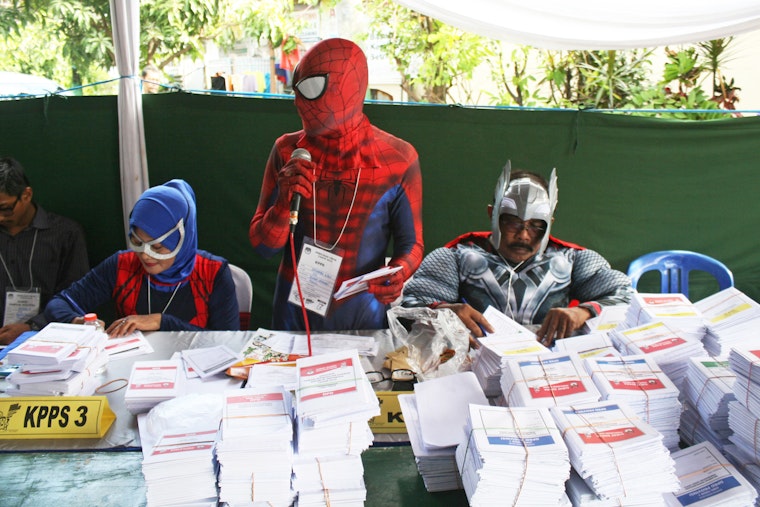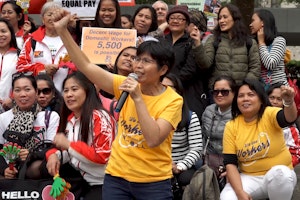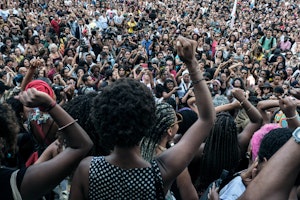The Complicated Legacy of Indonesia’s Elections
By Darmawan Triwibowo

On April 17, Indonesia conducted one of the biggest and most complex single-day elections in global history. Voter turnout was a record high. 154 million people—80 percent of the eligible voters—lined up to cast their ballots in one of the over 800,000 voting booths set up throughout the country. A festive atmosphere prevailed in wealthy urban suburbs, airports, remote villages, hospitals, and assisted-living facilities for people with disabilities. Election officials dressed up like zombies, Batman, and the Avengers; and polling booths were decorated with balloons, garlands and flowers. All to encourage people to perform their civic duty.
But democracy is not a done deal in Indonesia. Despite a robust electoral process, Indonesian democracy has serious flaws. The 2013 Mass Organizations Law has curtailed civil society by giving the government increased control over how people organize themselves, including the authority to disband groups. Rampant corruption continues to plague Indonesia’s political system. Key institutions established to tackle this issue, such as the Corruption Eradication Commission, are increasingly being curtailed.
Elections are not a panacea. A strong democracy depends on more than just casting your vote. Around the world, free and fair elections have voted in strongmen bent on dismantling democracies from the inside. The rise of so-called “illiberal” democracies in Europe and Asia has shown us that people in countries all over the world cannot sit back passively after organizing regular elections. A renewed commitment to protecting democratic integrity and the rule of law is necessary to counter the rising tide of authoritarianism.
How can civil society respond to the rising tide of populism and identity politics? How can it work to protect transparency and democratic principles? These are crucial questions that Indonesia, like many other countries around the world, must now confront.
Official confirmation of the electoral results has yet to be announced, but a “quick count” estimate gives President Joko Widodo 55 percent of the vote, putting him ahead of his opponent Prabowo Subianto by 10 points. The almost certain victory of the moderate incumbent has many breathing a sigh of relief. Yet, the impact of this divisive presidential campaign, during which the devoutness of candidates was debated more than their policies, will likely be felt for months to come. We still do not know how the aftershocks will manifest themselves in Indonesian politics.
In Indonesia, a country that is home to hundreds of ethnic groups and many different religions, engaging in identity politics is akin to playing with matches.
Politicians should be judged by their policy proposals, not by their religion. Citizens should not head to the ballot box out of fear that their country is lurching towards an Islamic state. Members of religious and ethnic minority groups should not fear for their safety when opposition rallies take over the streets. Civil society organizations must put pressure on political leaders and public institutions to protect fundamental values: democratic principles, human rights, diversity, and the respect of minority populations.
In the coming months, civil society organizations should continue to monitor the spread of hate speech and fake news, as well as the increased use of defamation and blasphemy laws against journalists and public figures in Indonesia. To keep identity politics from becoming an intrinsic part of Indonesia’s political culture, we must repair the damage done during the 2019 elections.
Darmawan Triwibowo is the former executive director of the TIFA Foundation.


